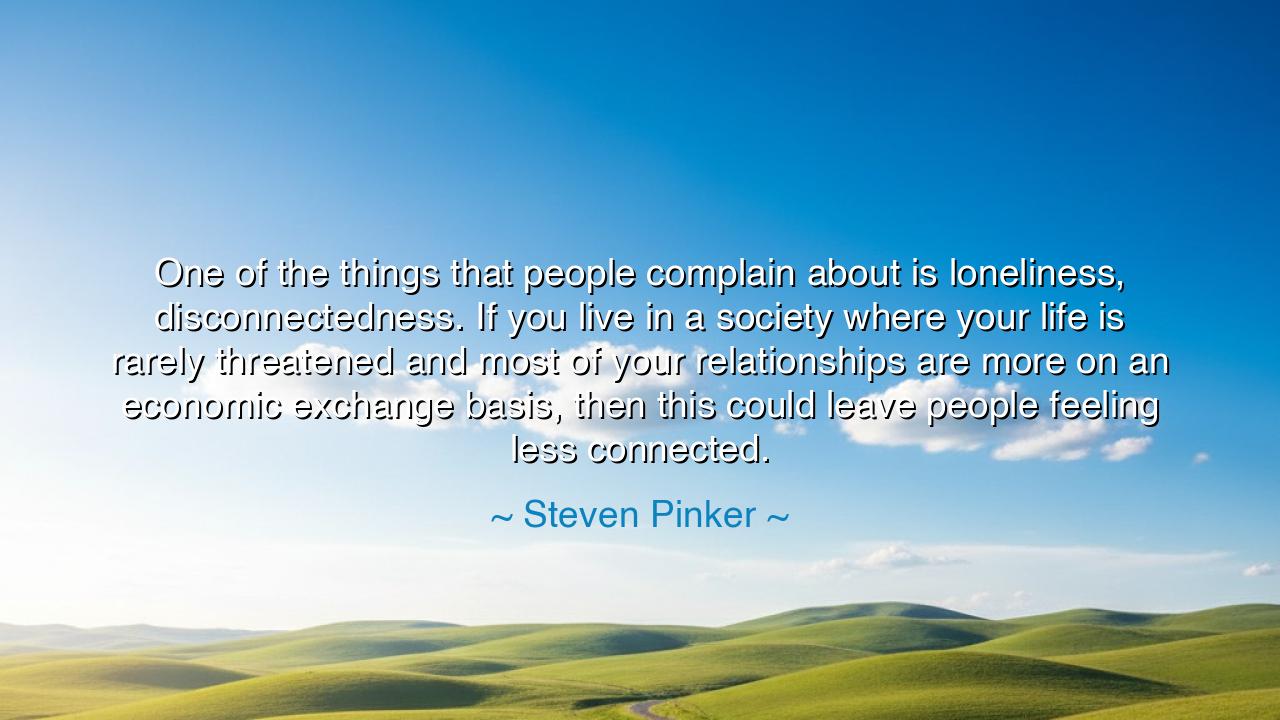
One of the things that people complain about is loneliness
One of the things that people complain about is loneliness, disconnectedness. If you live in a society where your life is rarely threatened and most of your relationships are more on an economic exchange basis, then this could leave people feeling less connected.






Hear, O children of the future, the words of Steven Pinker, a seeker of truth in the age of reason, who spoke thus: “One of the things that people complain about is loneliness, disconnectedness. If you live in a society where your life is rarely threatened and most of your relationships are more on an economic exchange basis, then this could leave people feeling less connected.” These words, though born of a modern scholar, carry the weight of ancient lamentations, for they describe a wound of the soul that has echoed through the halls of time: the pain of a man who finds himself surrounded by many, yet joined to none.
In ancient days, men were bound by necessity. To till the soil, to hunt the beast, to guard the village walls—they needed one another with a closeness stronger than iron. Bonds were not mere transactions, but lifelines, woven of trust, sweat, and shared struggle. When the wolves circled in winter, when the river threatened to flood the valley, no man asked his neighbor for coin; he asked for hands, for loyalty, for courage. Thus, in the danger of life, the heart of man was knit to the hearts of his fellows.
But in the age that Pinker observes, where death does not so easily stalk the city streets, and famine does not so often howl at the door, men and women find their ties reduced to the cold scales of commerce. “What can you give me?” replaces “How can I stand with you?” The butcher sells his meat, the banker his loans, the clerk his hours; and though they smile, though they bow politely, they do not embrace the soul of the other. Thus arises the strange paradox: the safer the body, the lonelier the heart.
Consider the tale of the Roman general Marcus Crassus, richest man of his age. He owned lands, armies, and slaves beyond number, yet he was despised even among his peers. His wealth bought alliances but not friendship, obedience but not love. And when he marched eastward to conquer the Parthians, seeking glory and honor to fill the emptiness within, he found no faithful brothers beside him when defeat fell upon him. His life ended not in triumph but in humiliation, for he had forged ties of exchange, not ties of connection.
So let it be remembered: security without fellowship breeds emptiness. A people who no longer know how to weep together, to labor together, to rejoice together, shall soon feel as though they walk in deserts, though surrounded by crowds. The heart does not feed on bread alone, nor does the soul find rest in riches. It hungers for touch, for trust, for the unspoken bond of being known and being needed.
What then is the lesson? That though our age shelters us from many terrors, we must not let our comfort make us strangers. We must learn once more to make bonds not with coin, but with kindness. Visit your neighbor not to borrow, but to share. Gather your friends not only in the feast of holidays, but in the quiet hours of everyday. Speak words that reveal the soul, not merely the price of goods. In doing so, you rebuild what the market cannot sell—the sacred fabric of belonging.
Take this teaching to heart, O listener: create connection where there is none, nurture it where it is weak, guard it where it is strong. For the wealth of a man is not counted in gold, but in the hands that reach for him when he falls, and the voices that remember him when he is gone.
Thus spoke the wise, and thus I pass it on. Guard against the coldness of economic exchange, and kindle instead the fire of human connection, lest you gain the world and yet walk through it as a shadow among shadows.






AAdministratorAdministrator
Welcome, honored guests. Please leave a comment, we will respond soon